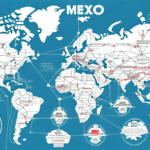Comparing FedEx and UPS International Shipping Rates
When it comes to international shipping, businesses have a choice between two major carriers: FedEx and UPS. Each offers a range of services and pricing structures, making it essential for businesses to understand the nuances of each carrier to select the best option for their needs. In this article, we will compare the international shipping rates of FedEx and UPS in detail to help businesses make an informed decision.
Understanding the Basics of International Shipping
International shipping involves the transportation of goods across national borders, requiring compliance with various regulations such as customs clearance, tariffs, and taxes. To simplify this process, shipping carriers like FedEx and UPS offer a range of services to help businesses navigate these requirements.
Key factors to consider when shipping internationally include:
- Mode of Transportation:
- Air Freight: Faster but more expensive.
- Sea Freight: Slower but more cost-effective for larger shipments.
- Compliance Requirements: Adhering to customs regulations, tariffs, and taxes.
- Packaging and Handling: Ensuring goods are packed securely to prevent damage during transit.
It's important to weigh the pros and cons of each option to choose the one that best fits your business needs and budget.
Factors that Influence International Shipping Rates
The cost of international shipping is influenced by various factors, including:
- Package Weight and Dimensions: Heavier and larger packages generally cost more to ship.
- Destination Country: Shipping to remote or less accessible countries can incur higher costs.
- Shipping Speed: Faster delivery options come at a premium price.
- Additional Services: Services such as insurance, tracking, and special handling can increase costs.
- Economic Factors: Fuel charges and currency fluctuations may lead to price adjustments.
Additionally, the type of goods being shipped can affect the cost. Items like hazardous materials or fragile goods may require special handling or packaging, increasing the overall shipping cost. Certain countries may also impose restrictions or regulations on specific types of goods, further impacting the shipping expenses.
The shipping distance plays a significant role in determining the cost. Longer distances typically result in higher shipping costs due to increased fuel and transportation expenses. However, some carriers may offer discounts for bulk shipments or shipments to specific regions or countries.
Overview of FedEx International Shipping Services
FedEx offers a variety of international shipping services tailored to different business needs:
- FedEx Express: The fastest international shipping service with delivery times ranging from 1-3 business days, ideal for urgent or time-sensitive packages.
- FedEx International Ground: A cost-effective option for shipping to Canada and Mexico, offering reliable delivery times and including customs clearance at no additional cost.
- FedEx Freight: A less-than-truckload (LTL) service suitable for businesses shipping large or heavy items internationally.
FedEx also provides additional services such as customs brokerage and international trade consulting to help businesses manage the complexities of international shipping.
Overview of UPS International Shipping Services
UPS offers a comprehensive range of international shipping services to meet diverse business requirements:
- UPS Worldwide Express: The fastest shipping option with guaranteed delivery times and door-to-door service, ideal for urgent shipments requiring expedited delivery.
- UPS Worldwide Saver: Balances speed and cost-effectiveness with delivery times typically ranging from 1-3 business days, suitable for reliable international shipping without high costs.
- UPS Worldwide Expedited: Offers a middle-ground option with faster delivery than standard services but at a lower cost than express options.
- UPS Standard: Designed for shipments to select countries, providing cost-effective and reliable delivery.
UPS also offers customs brokerage and international trade consulting services to support businesses in their international shipping endeavors.
Analyzing FedEx and UPS Pricing Structures
Both FedEx and UPS determine their pricing based on factors such as package weight, destination, and delivery speed. However, they have distinct pricing structures:
- FedEx: Generally offers a more straightforward pricing structure with transparent rates.
- UPS: Utilizes a more complex pricing model that may include variables like delivery area and fuel surcharges.
Both carriers provide discounts for high-volume shippers and special rates for industries like healthcare and e-commerce. Additionally, peak surcharges may apply during busy seasons or high-demand periods. It's crucial for businesses to analyze their shipping needs and compare the pricing and discounts offered by both carriers to identify the most cost-effective option.
How to Calculate Shipping Costs with FedEx and UPS
To estimate the cost of international shipments, both FedEx and UPS offer online calculators that consider factors such as package weight, dimensions, destination, and shipping speed:
- FedEx: Utilize the FedEx Shipping Calculator to get accurate estimates.
- UPS: Use the UPS Shipping Calculator for cost estimates.
Businesses can also consult directly with their carrier representatives to understand all applicable fees and any additional services required. Comparing rates between carriers and considering factors like delivery time, insurance options, and tracking capabilities can help businesses save money and ensure timely and secure deliveries.
Differences in Transit Times between FedEx and UPS
Transit times for international shipments vary based on the carrier and the specific service selected:
- FedEx: Generally offers faster delivery times, with options for same-day or next-day delivery in some areas.
- UPS: Possesses a wider global network, which may be advantageous for shipping to more remote locations.
While FedEx may provide quicker delivery, their rates can be higher compared to UPS for certain services and destinations. It's important to balance the need for speed with cost considerations to determine the most suitable carrier for your business.
Reliability and customer service are also critical factors. Both FedEx and UPS are known for reliable deliveries, but UPS has received higher rankings in customer satisfaction surveys. Evaluating the level of customer support each carrier offers can influence your decision.
Examining Additional Fees for International Shipping with FedEx and UPS
International shipments may incur additional fees beyond the standard shipping costs:
- FedEx: May charge fees for customs clearance, delivery to remote areas, and additional handling requirements.
- UPS: Can impose fuel surcharges, additional handling fees, and other variable costs based on shipment specifics.
Additional charges may include taxes, duties, and brokerage fees, which vary depending on the destination country and the type of goods being shipped. It's essential to research and understand these fees in advance to avoid unexpected costs.
Balancing transit times with shipping costs is crucial. Expedited shipping options offer faster delivery but at a higher price. Businesses should assess their priorities to ensure shipments are both timely and cost-effective.
Comparing Insurance Options for International Shipments
Both FedEx and UPS provide insurance options to protect against loss or damage during international transit:
- FedEx: Offers limited liability coverage included in the shipping cost, with options to purchase additional insurance for high-value items.
- UPS: Includes basic coverage, with the ability to add extra insurance based on shipment value and requirements.
It's important to review each carrier's insurance policies carefully, as coverage may vary based on the shipment's nature and value. Some items, such as fragile or perishable goods, might not be eligible for standard insurance coverage. Additionally, carriers may set limitations on the maximum value that can be insured. Considering the cost of insurance against the potential risk of loss or damage can help businesses make informed decisions. Comparing insurance options from multiple carriers and third-party providers is recommended to ensure adequate protection.
Best Practices for Packaging and Preparing Your International Shipment
Proper packaging and preparation are vital to ensure that international shipments arrive safely and without damage:
- Select Appropriate Packaging Materials: Use sturdy boxes, cushioning materials, and secure packaging to protect goods during transit.
- Secure Items Within the Package: Ensure that items are tightly packed to prevent movement and potential damage.
- Properly Label the Package: Clearly label packages with destination addresses and any required handling instructions.
- Comply with Customs Regulations: Ensure that all necessary documentation, permits, and declarations are prepared and accurate.
Researching the destination country’s import regulations is essential, as some countries impose restrictions on specific items, requiring additional documentation or permits. Using a reputable shipping carrier experienced in international shipping can provide valuable guidance on proper packaging, labeling, and compliance with regulations.
Understanding Customs Regulations and Requirements for International Shipments
International shipments are subject to varying customs regulations and requirements based on the destination country and the nature of the goods being shipped. Both FedEx and UPS offer customs brokerage services to assist businesses in navigating these complexities:
- Customs Brokerage: Facilitates the clearance of goods through customs by handling necessary documentation and compliance procedures.
- Import/Export Documentation: Ensures all required forms, permits, and declarations are accurately completed and submitted.
- Tariff Classification: Assists in correctly classifying goods to determine applicable duties and taxes.
Businesses should consult with their carrier and utilize available resources to fully understand and comply with all customs regulations and requirements, thereby minimizing delays and avoiding potential fines.
Comparing Tracking Capabilities of FedEx and UPS for International Shipments
Both FedEx and UPS offer robust tracking systems that allow businesses to monitor the progress of their international shipments:
- FedEx Tracking: Provides detailed updates on the shipment's status, including real-time location and estimated delivery times.
- UPS Tracking: Offers comprehensive tracking information with notifications and updates accessible via their online platform.
The level of detail and frequency of updates may vary depending on the carrier and the specific service used. Businesses should evaluate the tracking capabilities of each carrier to ensure they meet their monitoring needs and provide adequate visibility throughout the shipping process.
Customer Service Comparison: FedEx vs UPS for International Shipments
Effective customer service is crucial for resolving issues that may arise during international shipments. Both FedEx and UPS offer multiple channels for customer support:
- FedEx: Provides customer support via phone, email, and live chat, with dedicated representatives for international shipping inquiries.
- UPS: Offers comprehensive customer service options, including phone support, email assistance, and live chat, with a reputation for higher customer satisfaction.
Businesses should consider each carrier's customer service policies and reputation when choosing a shipping partner. High-quality customer support can significantly impact the resolution of shipment issues and overall shipping experience.
Choosing the Right Carrier for Your Business's International Shipping Needs
Ultimately, selecting the appropriate carrier for international shipping involves assessing your business's specific needs against the services, pricing, and reputations of FedEx and UPS:
- Service Offerings: Evaluate each carrier’s range of services to determine which align best with your shipping requirements.
- Pricing: Compare rates, discounts, and additional fees to identify the most cost-effective option.
- Delivery Speed: Consider the importance of delivery times and choose a carrier that meets your timelines.
- Customer Support: Assess the quality and accessibility of customer service to ensure reliable assistance when needed.
By thoroughly understanding and comparing the differences between FedEx and UPS international shipping rates, businesses can make informed decisions that ensure their international shipments are delivered safely, efficiently, and cost-effectively.




















